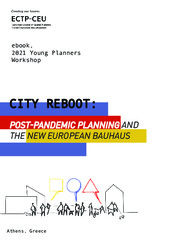| dc.creator | Pešić, Mladen | |
| dc.creator | Đorđević, Aleksandra | |
| dc.creator | Milovanović, Aleksandra | |
| dc.date.accessioned | 2023-11-25T20:40:35Z | |
| dc.date.available | 2023-11-25T20:40:35Z | |
| dc.date.issued | 2021 | |
| dc.identifier.issn | 978-2-9601363-8-8 | |
| dc.identifier.uri | https://raf.arh.bg.ac.rs/handle/123456789/1631 | |
| dc.description.abstract | Cities development and landscape transformation are under the constant influence of numerous challenges that need to be addressed through the planning process. The COVID-19 pandemic has opened completely new perspectives of research in various scientific fields and has put before planners a serious task of rethinking the post-pandemic city, it also opens the horizon of planners’ education in the context of the dynamics of the pandemic towards recovering cities and pandemic control. This paper aims to critically re-examine the state-of-the-art of existing curricula and to build on these foundations’ visionary ideas for learning about a post-pandemic city. The paper starts from the thesis that studies on the post-pandemic city should be interdisciplinary, multidisciplinary, and transdisciplinary (IMT), problem-based and future-oriented. At the methodological level, the research will engage the case study method, particularly the University of Belgrade, Serbia. The master level book of courses from 31 faculties in 4 scientific fields will be analysed in relation to the sustainable, beautiful, and inclusive city, highlighted as fundamentals of the New European Bauhaus initiative. The tendency is that the research results in the study program concept note at the master level, perceived as an IMT platform for planners’ education on post-COVID urban planning and design. Given that the Bauhaus as a movement was primarily oriented towards state school, the visionaryoriented approach will be used to define new studies for learning about the post-pandemic city. In line with the initial diagram of the Bauhaus curriculum developed by Walter Gropius in 1922, research output will be presented through a thematic diagram of the study program. | sr |
| dc.language.iso | en | sr |
| dc.publisher | Brussels: ECTP-CEU - European Council of Spatial Planners | sr |
| dc.relation | info:eu-repo/grantAgreement/MESTD/inst-2020/200090/RS// | sr |
| dc.rights | openAccess | sr |
| dc.source | ECTP-CEU Young Planners Workshop 2021 - City REBOOT: Post-Pandemic Planning and the New European Bauhaus | sr |
| dc.subject | New European Bauhaus | sr |
| dc.subject | Covid-19 | sr |
| dc.subject | planning education | sr |
| dc.subject | study programs | sr |
| dc.title | Towards Imaginary Studies: New European Bauhaus and Postpandemic Planners’ Education | sr |
| dc.type | conferenceObject | sr |
| dc.rights.license | ARR | sr |
| dcterms.abstract | Песиц, Младен; Миловановиц, Aлександра; Дјордјевиц, Aлександра; | |
| dc.citation.spage | 227 | |
| dc.citation.epage | 250 | |
| dc.identifier.fulltext | http://raf.arh.bg.ac.rs/bitstream/id/5285/2021_Towardsimaginarystudies.pdf | |
| dc.identifier.rcub | https://hdl.handle.net/21.15107/rcub_raf_1631 | |
| dc.type.version | publishedVersion | sr |

